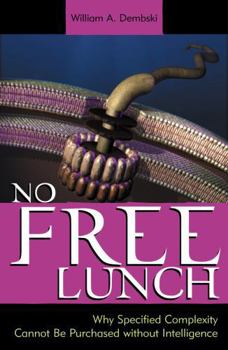No Free Lunch: Why Specified Complexity Cannot Be Purchased without Intelligence
Select Format
Select Condition 
Book Overview
Darwin's greatest accomplishment was to show how life might be explained as the result of natural selection. But does Darwin's theory mean that life was unintended? William A. Dembski argues that it does not. As the leading proponent of intelligent design, Dembski reveals a designer capable of originating the complexity and specificity found throughout the cosmos. Scientists and theologians alike will find this book of interest as it brings the question of creation firmly into the realm of scientific debate. The paperback is updated with a new Preface by the author.
Format:Hardcover
Language:English
ISBN:0742512975
ISBN13:9780742512979
Release Date:December 2001
Publisher:Rowman & Littlefield Publishers
Length:432 Pages
Weight:1.58 lbs.
Dimensions:1.2" x 6.2" x 9.3"












